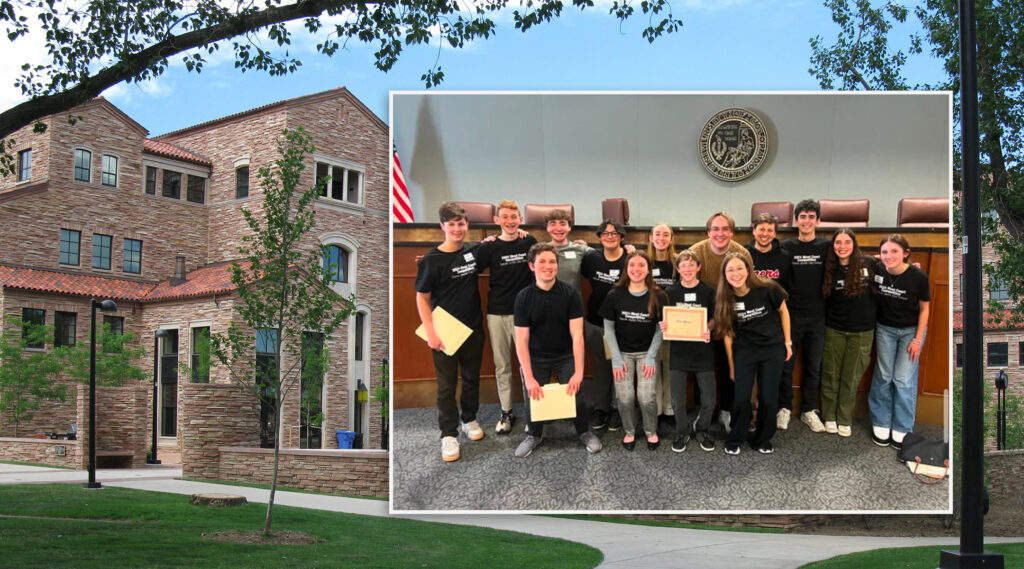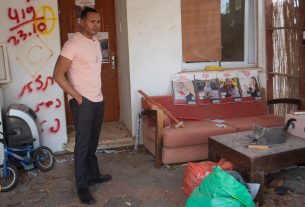This article was produced as part of (JEWISH REVIEW)’s Teen Journalism Fellowship, a program that works with Jewish teens around the world to report on issues that affect their lives.
Growing up in Jewish day school, I knew the Western Wall’s significance but I couldn’t grasp its deeper meaning when I visited it for the first time in 2016. Back then, it felt like just another stop on a trip full of kosher McDonald’s and sandy beaches.
Eight years and one war later, I realize it was more — a place of spiritual connection that planted a seed within me, one that has only now started to mature.
This year, that connection resurfaced, not in a synagogue or a Judaics class, but in a hotel lobby in Boulder, Colorado.
In November, 11 classmates and I traveled from Denver to the University of Colorado Boulder Law School for a statewide moot court competition. This was my second time competing. Both times my school was the only Jewish school at the competition. It didn’t bother me at all the first time, but this year it felt different.
I don’t know if it was because of the war in Gaza and the rise in antisemitism or if it’s because as a teen, I’m still figuring out my identity. But it irks me when people make judgments about me based on things that I haven’t even decided about myself.
The Boulder trip was only a week after the election and belonging to such a small minority (Jews represent 3% of the greater Denver Area population) during a politically polarized climate, made me feel like a living, breathing representative of my culture. I was one Jewish teen, and yet, I was every Jewish person. It felt like a single action could influence someone’s perspective of not just me, but of our whole religion.
Despite having the word “Jewish” printed across the front of our shirts provided at the competition, I still found myself tucking my Jewish star necklace under my shirt as I walked into the tournament. It wasn’t logical. Yet, in that moment, it was a reflex. Whenever I go to a public non-Jewish space or event, I hide my star. Jewish kids around the country have been making the same calculations about how to “represent” in public since Oct. 7, and many before that. I don’t want to be a hate crime victim, or invite judgment of whatever political undertones the Jewish star now conveys.
Nobody at the Boulder competition said anything weird to me, but one of my teammates, Kobi, who made a conscious decision to wear his kippah to the competition, had no such luck.
On the first day of the tournament, another competitor asked him “Are you bald under there?” and “Can I try on your Jew hat?” While these comments came across as insensitive or even antisemitic to me, Kobi perceived them as genuine curiosity from an uneducated high school student. He let the other kid try on the kippah and taught him the significance of it.
“I think the response of trying to reach out and help people understand who we are as a people should always be the first response,” he said.
I admire Kobi’s grace. The whole team did. It deepened our determination to show that we are not just “some Jewish school” but a school rich in values and purpose. We practiced our arguments, discussed intricate legal questions as the day went on and eventually won half of the six championship spots — for the second year in a row.
The Friday before the competition, my team gathered around a fireplace in the hotel lobby to say Kiddush and Hamotzi.
Justice William W. Hood III shakes hands with student Kobi Benel at the state-wide moot court competition held at the University of Colorado Law School in Boulder, Colorado, November 2024. (Courtesy Cooper Coughlan)
Due to snowy conditions that night, our Shabbat dinner plans at Hillel got cancelled. The dinner that was prepared for us was delivered to the hotel.
As we all helped lead Kiddush, we got looks from many hotel guests, none of whom we knew. Some glanced over and turned away, others stared longer with a seemingly annoyed, yet curious expression; needless to say, it felt odd.
I could only imagine what they might be thinking — perhaps we were interrupting their silent revelry or maybe they felt disgust, or were genuinely curious. Eventually I realized it didn’t matter what the hotel guests were thinking, especially as I was uttering the holy words of Kiddush. Instead, I was thinking about how lucky I was to be there, surrounded by my beloved friends, embracing my beloved religion. To be honest, this was one of the few times I openly expressed my Jewish identity in a non-Jewish space, with an audience present.
Despite the discomfort, I knew I couldn’t — and wouldn’t — let that dictate what I was feeling. In turn, we persisted, proud of our Judaism.
Just as in anything, there were glimpses of light. The hotel staff were kind to accommodate our religious practices and later into the night, hotel guests came and chatted with us as we practiced.
As we served ourselves from the trays of lukewarm schnitzel in the hotel lobby, I knew this was the moment: the moment I stopped being so self-conscious about my Judaism and started to become self-confident in it. I felt proud that we kept praying and proud of that seed that was planted many years before.
“It was one of those moments where you realize what you’re doing is so weird, but you love it so much,” said sophomore Julie Steiner, another competitor. “We were exactly where we were supposed to be.”
In Denver, I’m constantly surrounded by a Jewish community — my friends, my school, my family. But the competition brought me out of that bubble and into a reality different from my own.
Many times I question who I really am as a Jew and I’m not quite sure what that answer is yet, but what I do know is that I am a proud Jew. I am no longer afraid of judgement and no longer afraid to wear a kippah. As Jews, we have to stick together and we can’t be ashamed or afraid of what others think.
This trip gave me just that: the courage and faith to do the simple action of wearing my kippah out in public. Now, out in public, I make a concerted effort to wear my kippah out — for pride, for representation and for strength.
The views and opinions expressed in this article are those of the author and do not necessarily reflect the views of (JEWISH REVIEW) or its parent company, 70 Faces Media.




